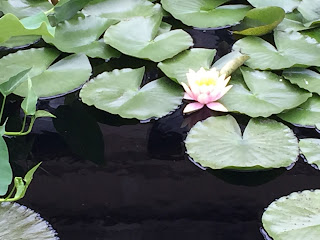Blank page. Blank screen. Blank mind. Writer’s block has tormented just about every writer who attempted the craft. The most prolific of writers will bump against the edge of their imaginations and will be left not knowing where to go next. If all writers encounter the inability to write the next sentence, why do we writers find it so terrifying? Peeking over the shoulder of writer’s block is the fear that there are no more words, no more images, no more metaphors. There is not another story, poem, essay, or article anywhere inside the brain. Originality is gone. The rest of life will be Lifetime movie writing. But writer’s block does not have to be a force that tears you down and destroys. If you can accept that the dry spell is only temporary, and approach it is an opportunity and not a reason to crawl into a paper bag and never crawl back out, then your brain will be more willing to snap out of its doldrums and jump back in or start a new project.
If your case of writer’s block feels especially painful or has been going on for some time, consider giving yourself a set amount of time to remain in your fallow period. Just as a field needs to rest or it will lose all its ability to produce, your creativity needs a chance to wander, consider, and conserve some energy. A fallow period may only mean that you are just resting up for the next big thing. So give yourself permission to take one more day, week, or even a month. The cessation of pressure may allow you to come back in full-force when you are ready. Anxiety can be deadly to the imagination. So, try to distract and inspire yourself.
- Take a walk. Literally. Get outside. If you live near a park, woods, or any other expression of nature, go there and meander. Be as aware of your surroundings as possible and try to step outside of yourself, Emerson style. If you don’t live near nature, just be outside and observe buildings, traffic, and people. Try to see the things you’ve seen before not as daily sights, but look with fresh eyes. Or, explore a part of your town or city you are unfamiliar with. The idea is to help you slip outside of yourself, spark your senses, and hopefully come up with some new ideas.
- Exercise. Preferably something you enjoy, like yoga, zumba, or basketball. But anything will do: jog, lift weights, run after a dog or child. Get your heart beating and strain your muscles. Changing your breathing and heart rate can not only distract you, but helps to change your thought patterns. It also releases stress. If you can, build exercise into your weekly schedule. You’ll find that these times will help you work out concepts so that when you are in front of your laptop again, you already know how you’re going to start.
- Look to another art. Go to a museum, gallery, concert, or Color Me Mine. Listen to music you would not usually listen to or pick up your forgotten trumpet. See a movie in the theater. Cut up some magazines and make a collage. There is no need to indulge in high art, but if you wish to go to an opera or ballet, enjoy. Soak it in. See how someone else does it, or try something new. A caution--now is probably not the time to turn to TV. The addictive quality and general lack of mental stimulation is probably not the best to help you snap out of mental inactivity. TV has its purposes and value, but is not generally an inspiration for writers.
- Reread something that inspired you way back when. Sometimes going back to the books that made you want to be a writer can help you start up again because you remember what it was you loved about reading and writing to start with. Many times I’ve reread Anne Sexton’s Transformations and it still gives me the shivers and makes me want to set my pen to paper. I first read the poems in high school, and I remember when I could depend upon spontaneity and had the flexibility to start scribbling as soon as I had an idea. If nothing else, returning to well-loved works should relax you as you enjoy the often-trod words.
- Try your hand at a different genre. If poetry is not bubbling up from your font of creativity, try some journal or essay writing. Help another writer by reading a recently released book and reviewing it. You might even attempt graphic novels, lyrics, or concrete poetry. Maybe you want to combine visual art with writing, or take a whirl at playwriting. Allowing yourself to shift into a different genre can help you shift your thinking and encourage you to tap into ideas that might not work in your primary genre. It helps to be versatile, and you might find something that you love as much (or almost as much) as your primary genre.
Whatever you do, don’t despair. Your brain needs a rest from time to time, just like everyone else’s. This does not mean that you are not a phenomenal writer or committed to your craft. It does not mean that you have written your last story or that you will never have an idea worth pursuing again. Writer’s block is an opportunity to explore your world in a way you had never before. It is a chance to bring play back to your practice. Accept the frustration with the potential gifts, and you might well begin your next and best piece soon.






